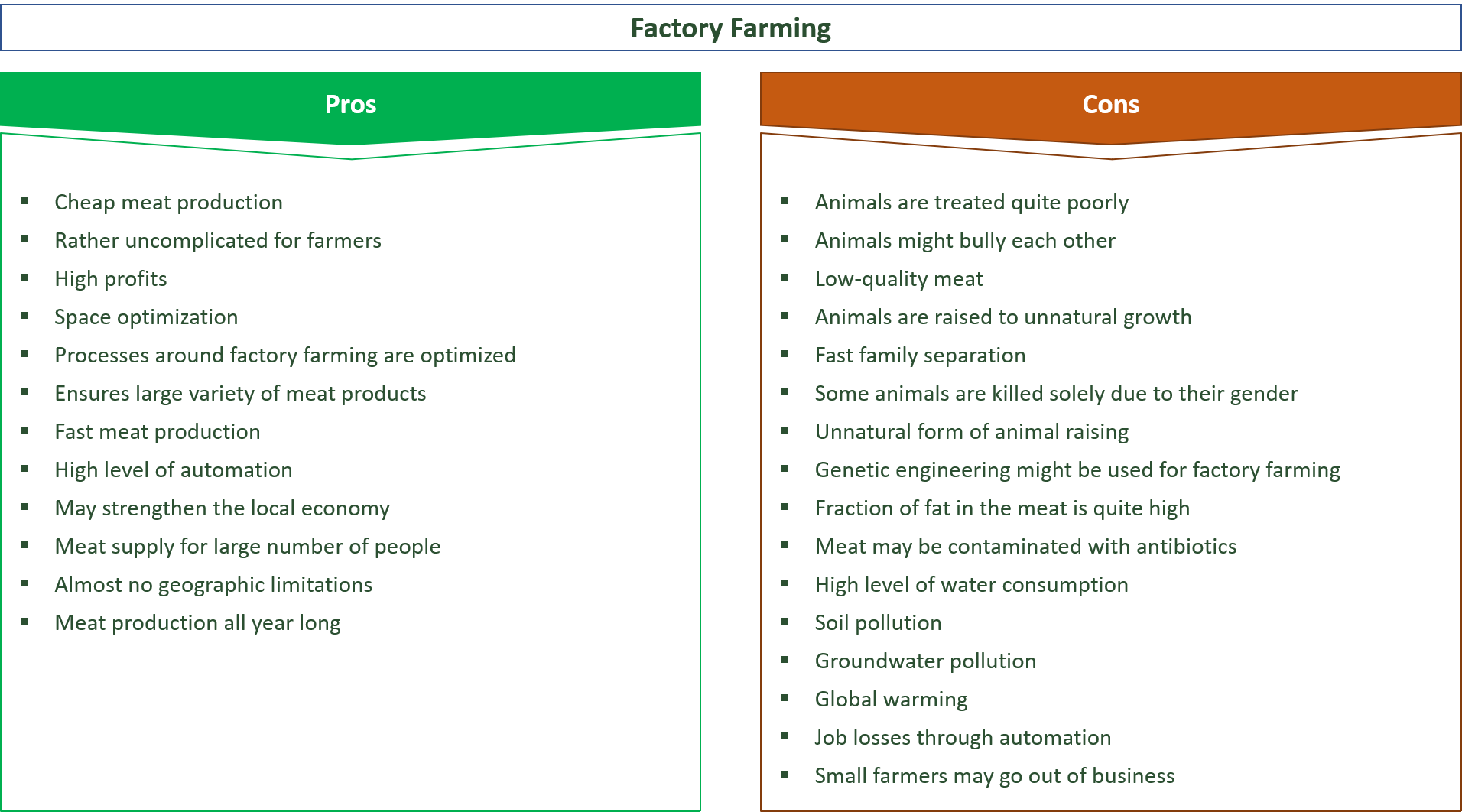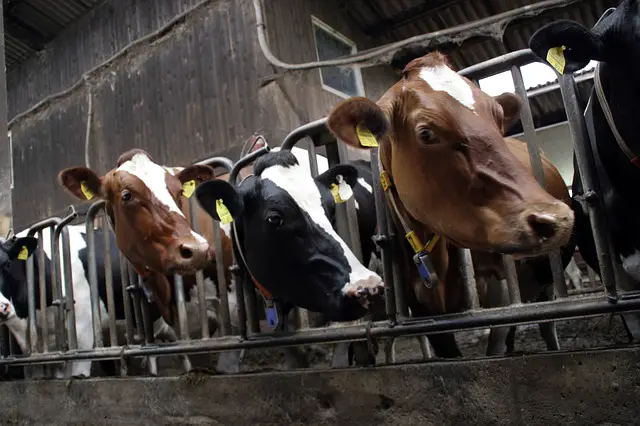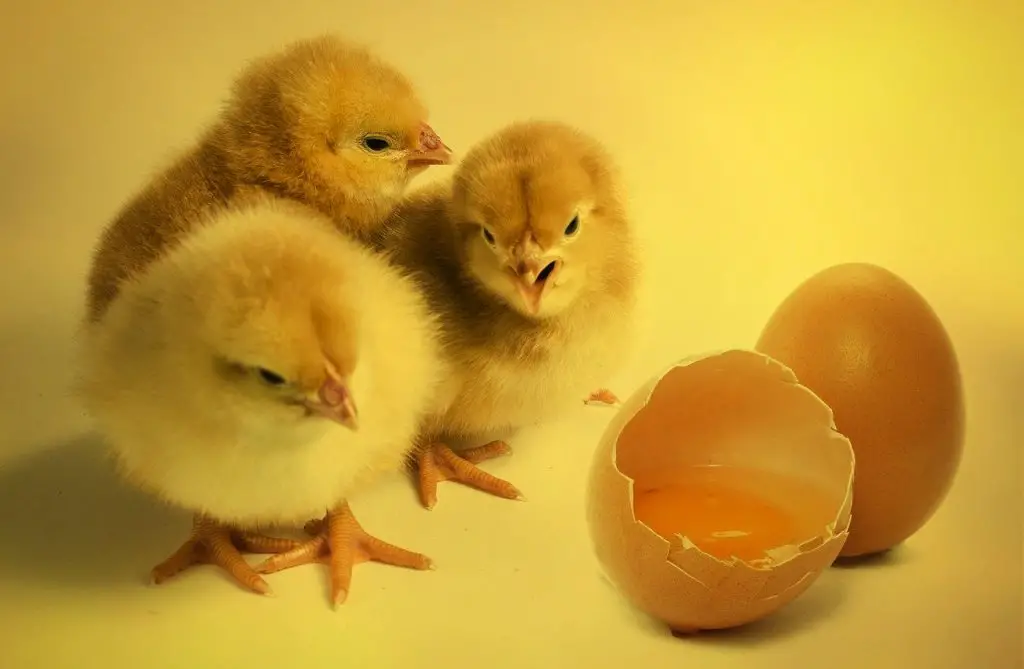“I’ve always had issues with factory farming. That was always something that bothered me.”
Paul Wesley, Actor
Advantages & Disadvantages of Factory Farming

Factory farming (also often referred to as industrial livestock production or intensive animal farming) can be defined as raising farm animals in a way to maximize profits.
In this process, it often doesn’t matter how animals are treated and under which circumstances they have to grow up as long as the profits are high.
Animal rights activists often claim that factory farming should be abandoned since animals would suffer quite a lot from the adverse conditions in those farms.
In this article, the pros and cons of factory farming are examined.
Audio Lesson
Contents
Advantages of Factory Farming
- Cheap meat production
- Rather uncomplicated for farmers
- High profits
- Space optimization
- Processes around factory farming are optimized
- Ensures large variety of meat products
- Fast meat production
- High level of automation
- May strengthen the local economy
- Meat supply for large numbers of people
- Almost no geographic limitations
- Meat production all year long
Cheap meat production
One major advantage of factory farming is that it enables us to produce large amounts of quite cheap meat.
When you are at the grocery store next time, take a look at the price of chicken legs.
You will likely see that one pound of chicken will be even less expensive than a pound of tomatoes.
That’s nuts! We are talking about an animal life here which is sold cheaper than crops from a plant.
This comparison shows how cheap meat really is in many parts of our Western world due to factory farming.
Even though this might be great for consumers, it can still be regarded as quite problematic regarding ethical aspects.
Rather uncomplicated for farmers
Factory farming is also quite uncomplicated for farmers since most processes are standardized and also the maximum number of animals that are allowed is also determined by the state or national law.
Thus, once farmers have set up their factory farming processes, they do not have to take too many adjustment efforts anymore.
Moreover, it is also quite easy to keep animals healthy since large amounts of antibiotics are used in those factory farms.
Even though this use of antibiotics can be extremely dangerous to human health, it is quite convenient for farmers since they can solve almost any animal health problems through the use of those antibiotics.
High profits
Factory farming also often involves high profits for farmers. Even though they only earn a few cents per animal, due to the huge amount of meats they sell to grocery stores, factory farmers are still able to earn high profits every year.
The bigger the farm, the more animals can be raised and the higher the profits in the long run.
Especially in regions where there is a shortage of meat producers, profits can be huge since the profit margin for factory farmers will be higher due to less competition.
Space optimization
Through factory farming, also the space for raising cattle and other animals is used in a quite efficient manner.
Since animals are penned up and each animal only has quite limited space, a high number of animals can be raised.
Thus, from an efficiency standpoint, factory farming has an important edge over organic farming since many more animals can be raised on a given area of land.
Processes around factory farming are optimized
Since factory farming has been around for quite a while now, the processes around factory farming have been optimized as well over time.
This not only includes the processes inside the farm, but also the logistics around it.
For instance, when animals reached their target weight, machines will recognize that and the system will inform the farmer that it is time to bring those animals to the slaughterhouse.
The slaughter will no when he has to pick up those animals and will free his capacities in order to be able to process them in time.
After the slaughter finished his work, the meat will end up in our grocery stores quite fast.
Thus, all steps around meat production have been optimized through factory farming, which makes it not only a cheap and efficient form of meat production, it also ensures that the meat will end up in our supermarkets quite fast and therefore ensures the meat supply for a great number of people.
Ensures large variety of meat products
Since many different animals can be raised in factory farms, a large variety of different meat products can be ensured for the customer.
Although some farms may only specialize in raising one animal race, there will likely be many factory farms around and the meat supply with all kinds of meat will be ensured in most regions.
This not only gives the consumer high levels of freedom of choice regarding what kind of meat he or she wants to have, but it also increases the level of competition and consumer prices for meat may also drop due to that.
Fast meat production
Another upside of factory farming is that the production of meat is a quite fast process.
Through the use of specific animal food that contains large amounts of proteins and other substances that foster growth, animals on those farms can be raised at a fast pace.
The life expectancy of those animals will be much lower compared to animals from organic food farms since they grow much faster and will much sooner reach their optimal weight.
High level of automation
Big factory farms have also optimized and automated their processes.
It is quite common that most work is done with the help of machines.
Also the monitoring is carried out mainly by robots that are able to detect all kinds of diseases and also determine when it is time to bring animals to the slaughterhouse.
Therefore, only a quite limited number of workers are needed and especially for jobs that are quite unpleasant, machines could substitute workers, which may benefit both the owner and the staff of those factory farms.
May strengthen the local economy
In some regions of our planet, factory farming might also be quite an important source of income for the local population.
Especially in structurally weak areas of our planet, some farmers may rely on factory farming as their single source of income and also the local population may be dependent on the meat from those farms.
Thus, factory farming may also be an important food source for many people, especially in the poor parts of our planet.
Meat supply for large numbers of people
Our nowadays society urgently relies on meat as a major food source.
While meat was quite a scarce good and was quite expensive a century ago, it is no considered to be a mass good and nothing special anymore.
Therefore, especially in our Western world, many people consume large amounts of meat every day.
Thus, billions of people are now dependent on meat as a major food source and those people may not be willing to switch to vegetarian diets anymore.
In order to meet the growing demand for meat on a global scale, factory farming is crucial since it is the only way to produce such large amounts of meat on a daily basis.
Almost no geographic limitations
Big farms can be built in almost all parts of our planet.
Since those farms are often closed and protected against all kinds of weather extremes, they are rather independent of outside conditions.
This makes it quite easy to construct those farms in many different locations of our planet.
However, it has still to be assured that there is also appropriate infrastructure around those farms in order to process large amounts of meat in time in an efficient manner.
Meat production all year long
Since factory farming is quite independent of outside conditions and most animals will never have the opportunity to get outside the farm, large amounts of meat can be produced all year long.
This ensures a big variety of meat products for consumers.
For instance, it doesn’t matter if you go to a grocery shop in summer or in winter.
You will find your favorite kind of meat all year long, no matter if there is hot weather or heavy snow outside.

Disadvantages of Factory Farming
- Animals are treated quite poorly
- Animals might bully each other
- Low-quality meat
- Animals are raised to unnatural sizes
- Fast family separation
- Some animals are killed solely due to their gender
- Unnatural form of animal raising
- Genetic engineering might be used for factory farming
- Fraction of fat in the meat is quite high
- Meat may be contaminated with antibiotics
- High level of water consumption
- Soil pollution
- Groundwater pollution
- Global warming
- Spread of diseases
- Human health issues
- Unpleasant smell
- Encourages higher level of meat consumption
- Job losses through automation
- Small farmers may go out of business
- Can contribute to global hunger
Animals are treated quite poorly
Although it has some advantages, there are also many issues related to factory farming.
One important problem of factory farming is that animals are treated quite poorly.
They often have insufficient space and are penned up quite close to each other.
This leads to a state in which many animals suffer from psychological problems since it is in their nature to move in order to stay healthy.
If they are not able to move sufficiently, chances are that those animals will suffer a lot during their stay in those factory farms.
Moreover, since most of the processes are regulated by machines, it will not be possible to take care of single injured animals.
Those animals will often be ignored and will suffer from significant pain during their lives.
Animals might bully each other
Due to the confined space in factory farming, animals may also start to bully each other.
It can often be observed that pigs bite each other or that chickens may even pick on each other until they bleed or even die.
This can be also seen in some videos from animal rights activists who secretly filmed the adverse conditions in those farms.
Thus, due to the confined space and the unnatural living conditions of animals in factory farms, they will also bully and hurt each other on a regular basis.
Low-quality meat
Also the meat from factory farms often is of quite low quality.
Since animals are raised in order to maximize their weight in a minimum period of time, the meat will consist of plenty of water and will not be that tasty compared to meat that comes from organic farms.
Meat producers often try to hide the low quality of their meat by marinating the meat with plenty of spices and sauces.
By doing so, the true flavor of the meat can be covered and people may not recognize the low meat quality anymore.
Animals are raised to unnatural sizes
Due to the concentrated feed and confined space, animals will be raised quite quickly.
These animals are often raised to unnatural sizes in order to maximize their weight and to maximize profits.
However, it should be clear that an unnatural growth of animals often also implies lower quality meat since the meat itself often contains much more water and fat.
Fast family separation
Another problem with factory farming is that animal families are separated just after a few days.
While on organic farms, animal families can often stay together for many days or even weeks after the mother has given birth, factory farming implies the separation of animal families after a quite short period of time in order to maximize profits.
This may be regarded to be quite cruel and also unnatural since the mother and her calves will stay together in nature much longer compared to the processes in factory farming.
Some animals are killed solely due to their gender
Another big issue with factory farming is that many lives are ended right after birth has taken place due to the fact that those animals have the wrong gender.
For instance, in the chicken industry, millions of male chickens are shredded every day since they are not useful for egg production.
The killing of animals solely due to their gender can be regarded to be quite unethical and animal rights activists often claim that this should be forbidden by law.
Unnatural form of animal raising
The conditions inside factory farms are quite unnatural.
Animals do not have enough space to move and to grow in a physically and mentally healthy manner.
They may also bully each other since the unnatural raising conditions may lead to plenty of aggression.
Consumers have to decide whether they want to support those unnatural conditions or not.
In my opinion, we should raise our animals as natural as possible and factory farming is definitely not an environment that meets those conditions.
Genetic engineering might be used for factory farming
In order to maximize profits, the fast growth of animals is crucial in the process of factory farming.
However, apart from using concentrated feet, genetics are also often altered in order to speed up growth even further.
This kind of genetic engineering is often criticized by opponents of factory farming since we do not know how all this will turn out in the long run.
Genetic engineering has some advantages, yet it also implies serious dangers.
Thus, it is unclear whether genetic engineering should be used in factory farming, also from an ethical standpoint.
Fraction of fat in the meat is quite high
Since animals are raised with concentrated feed and also have hardly any space to move, the fraction of fat that is contained in meat from factory farming is usually much higher compared to the meat from organic farms.
This may contribute to the obesity problem and may also lead to serious health issues related to that.
Meat may be contaminated with antibiotics
Another downside of factory farming is that large amounts of antibiotics are used in order to keep the vast number of animals healthy.
However, the use of those antibiotics also implies serious issues.
For instance, if we consume meat from those animals, we may become resistant to certain kinds of antibiotics.
This is problematic since antibiotics are often used to treat diseases.
These antibiotics may no longer work to treat diseases due to the developed resistance and many people might die in the long run due to antibiotic resistance caused by meat from factory farming.
High level of water consumption
Industrial farming also implies the use of large amounts of water. This may be especially problematic in regions where there is already a lack of water.
Since water will become a quite precious resource in the future due to global warming, there might be conflicts between factory farmers and the local population and in extreme cases, the production of meat through factory farming may even lead to the death of many locals, especially in the poor parts of our planet.
Soil pollution
Factory farming also implies significant soil pollution.
Since animals in those farms need large amounts of feed, large amounts of crops have to be produced on a daily basis.
In order to meet this supply of feed, plenty of chemical fertilizer has to be used.
However, the use of excessive fertilizer also hurts the soil. In the long run, whole fields may become unsuitable for farming since the soil may be irreversibly damaged through this fertilizer use.
Thus, factory farming may also be not sustainable in the long run since it implies excessive soil pollution.
Groundwater pollution
Due to the excessive use of fertilizers and other harmful substances in the factory farming production chain, our groundwater may also become significantly polluted over time.
Sooner or later, the contaminants in the soil will be washed into our groundwater due to rain.
Especially in regions that already suffer from a lack of clean water, factory farming may lead to a state of serious water shortage, which may lead to plenty of problems for locals who may no longer be able to afford clean water for daily use.
Global warming
Another issue of factory farming is that it also contributes to global warming.
The production of meat implies the emission of harmful greenhouse gases into our atmosphere.
Since a high number of animals are raised on each farm, the greenhouse gas emissions implied by industrial meat production are enormous.
Therefore, if we want to slow down global warming, we also have to reduce factory farming practices, which also implies a change of our consumption behavior towards a diet that consists of more vegetables and fruits and of less meat.
Spread of diseases
Since animals in factory farming are penned up quite close to each other, also diseases can easily spread from one animal to another.
Even though large amounts of antibiotics are used to keep diseases inside factory farms under control, there might still be the risk that some animals that are infected with diseases may end up in our grocery stores.
If we consume meat from those animals, especially if the meat is still medium or raw, those diseases may also infect us humans and may lead to serious epidemics or even pandemics.
Human health issues
In general, factory farming can be regarded as a health risk for humanity as a whole.
Due to the fact that plenty of antibiotics are used, chances are that humans become antibiotic-resistant in the near future.
This may lead to serious treatment issues if antibiotics are no longer working for medical purposes anymore.
Moreover, penning up animals can also lead to the development of serious diseases, which may infect humans sooner or later.
Thus, the health risks related to factory farming may be quite serious and consumers should be aware of that when it comes to buying decisions regarding their favorite meat.
Unpleasant smell
Since a high number of animals is raised on a pretty confined space, factory farms are also often responsible for serious smell.
People living close to those farms often complain about the odor nuisance.
Thus, the quality of life may be vastly decreased for people living close to those factory farms and also the property prices may be quite low due to that.
Encourages higher level of meat consumption
Due to the cheap price of meat that comes from factory farming, people will also have the incentive to consume excessive amounts of meat.
However, this should not be the goal at all.
We all have to consume less meat in order to slow down global warming and also to be able to feed our growing world population.
Thus, cheap meat prices give people a wrong incentive for excessive meat consumption.
Instead, prices for meat should increase rather than decrease so that people become more aware of the problems that are associated with excessive meat production.
Therefore, factory farming may also incentivize people to consume excessive amounts of meat due to cheap prices, which may lead to all kinds of serious environmental problems in the long run.
Job losses through automation
Even though the automation of processes can be considered to be a good thing since it takes away unpleasant tasks from workers, it may also lead to job losses since many tasks can be carried out by machines and workers may not be needed anymore.
Thus, for some people who work in the meat production business, factory farming and the increasing level of automation related to it may cause the loss of their jobs.
Small farmers may go out of business
Factory farming is also a big danger for small meat production businesses.
For instance, imagine you operate a small farm and produce high-quality meat.
One day, a big factory farm opens in your region and produces meat much cheaper.
Chances are that the big grocery stores may prefer the cheap meat since they also want to offer cheap meat to the end consumer.
If this is the case, you might no longer be able to compete and may go out of business sooner or later.
Thus, many small farmers may also be forced to give up their business due to the expansion of factory farming.
Can contribute to global hunger
Our excessive meat demand and the related need for factory farming may also be a serious cause for global hunger.
Since for the production of every calory of meat, multiple calories of plants have to be used, we may no longer be able to feed our growing world population.
Meat production and consumption can be regarded to be quite inefficient since we could feed more people by switching to a diet that relies on vegetables and fruits instead.

Top 10 Factory Farming Pros & Cons – Summary List
| Factory Farming Pros | Factory Farming Cons |
|---|---|
| Cheap meat | Poor animal treatment |
| High profits | Antibiotic resistance |
| Space is used quite efficiently | Spread of diseases |
| Optimized processes | Quick family separation |
| Fast meat production | Job losses |
| Important for many local economies | High water consumption |
| Assures large variety of meat | Low-quality meat |
| Geographic flexibility | Groundwater pollution |
| Meat production all year long | Global warming |
| High automation levels | Soil pollution |
Conclusion
Factory farming is quite important to provide us with large amounts of meat every day.
Due to the growing demand for meat, it is the only way to supply those amounts of meat to the end consumer.
However, factory farming also implies many serious problems.
Thus, every one of us should consider reducing their meat consumption so that factory farming might no longer be needed in the future.
By doing so, every one of us could make his or her contribution to protect our animals from adverse living conditions and we could also improve our ecological footprint at the same time.
Sources
https://en.wikipedia.org/wiki/Intensive_animal_farming
https://www.farmsanctuary.org/learn/factory-farming/
https://80000hours.org/problem-profiles/factory-farming/

About the author
My name is Andreas and my mission is to educate people of all ages about our environmental problems and how everyone can make a contribution to mitigate these issues.
As I went to university and got my Master’s degree in Economics, I did plenty of research in the field of Development Economics.
After finishing university, I traveled around the world. From this time on, I wanted to make a contribution to ensure a livable future for the next generations in every part of our beautiful planet.
Wanna make a contribution to save our environment? Share it!
